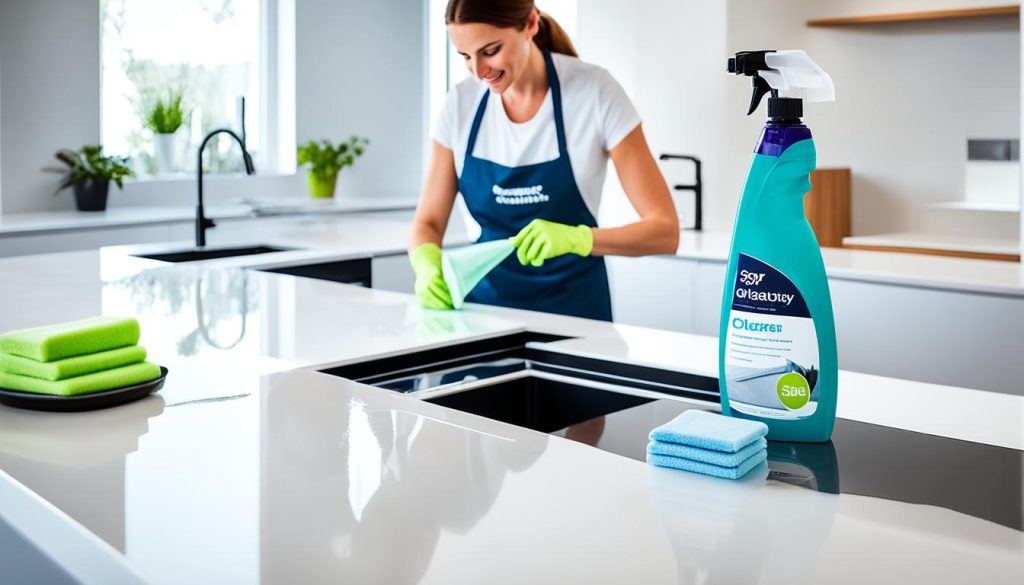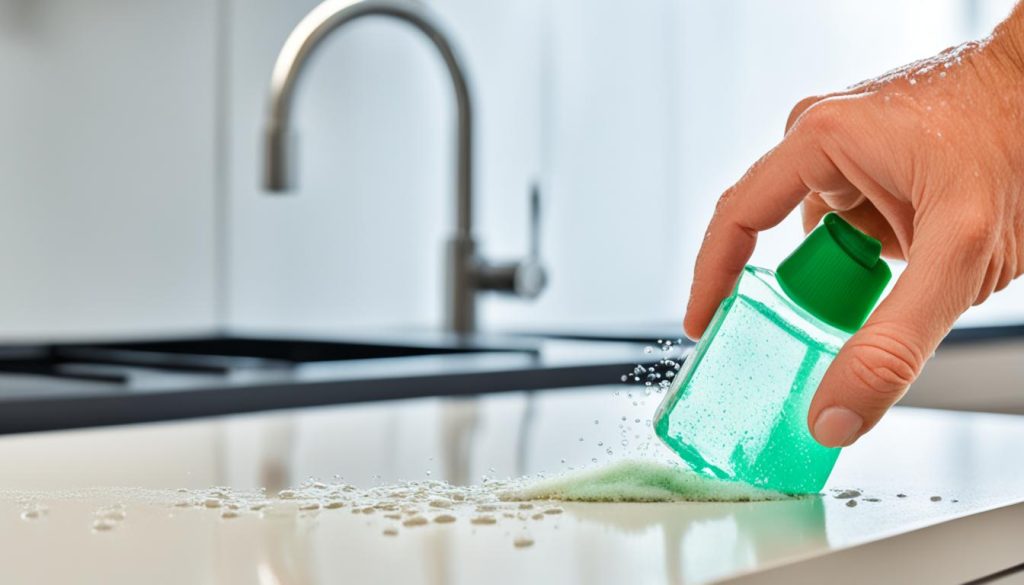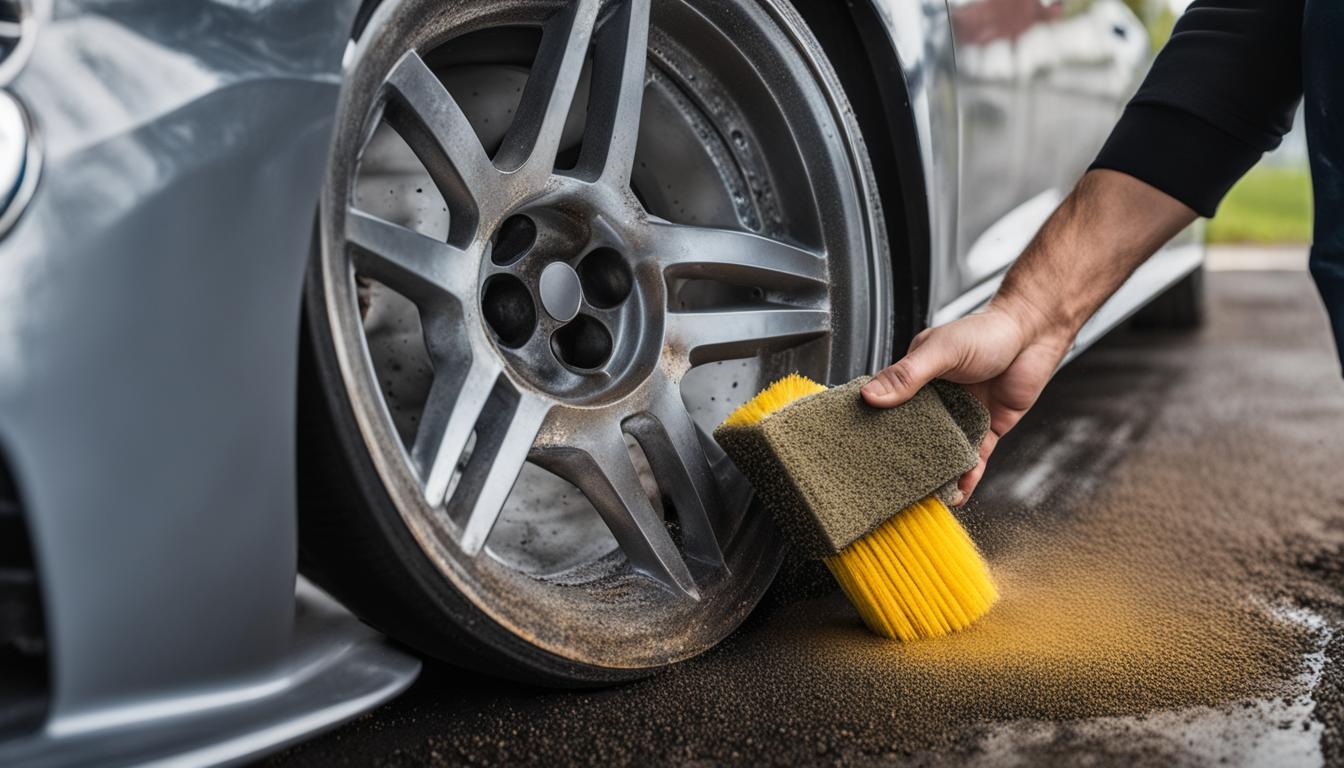Quartz worktops are a popular choice for homeowners due to their durability and sleek appearance. To effectively clean and maintain quartz worktops, there are a few important steps to follow. Regular cleaning with soapy water or a mild detergent is recommended to remove dirt and grime. It’s important to avoid excess heat and stains by using trivets and avoiding contact with acidic substances. Harsh chemicals like bleach should never be used on quartz worktops. Consistency is key, so it’s important to develop a regular cleaning routine to keep quartz worktops looking their best. So, Let’s look at how to clean Quartz worktops.
The Benefits of Quartz Worktops
Quartz worktops offer numerous benefits for homeowners. These durable worktops are made from a hard-wearing material that does not require sealing like granite. With their scratch-resistant properties, quartz worktops are well-suited for busy kitchens where accidents can happen. They can withstand daily wear and tear without showing signs of damage, resulting in worktops that maintain their pristine appearance for years to come.
One of the key advantages of quartz worktops is their consistent appearance. Unlike natural stone surfaces, such as marble or granite, quartz worktops offer a uniform pattern and color throughout. This ensures that your worktops always look their best, providing a sleek and stylish aesthetic to your kitchen.
Homeowners also love quartz worktops for their easy maintenance. Unlike other surfaces that require regular sealing or polishing, quartz worktops are relatively low maintenance. They do not absorb liquids, making them highly resistant to stains caused by spills or food preparations. To keep your quartz worktops looking pristine, all you need is a gentle cleaner and a non-abrasive cloth or sponge.
“Quartz worktops offer durability, scratch-resistance, and easy maintenance, making them a practical choice for homeowners.”
By choosing quartz worktops, you can enjoy the benefits of a beautiful and functional kitchen without the hassle of high maintenance. Whether you have a busy household or simply prefer a low-maintenance countertop option, quartz worktops are an ideal choice that offers both style and practicality.

| Benefit | Description |
|---|---|
| Scratch-Resistance | Quartz worktops are highly resistant to scratches, making them perfect for high-traffic kitchens. |
| Consistent Appearance | With a uniform pattern and color, quartz worktops provide a sleek and stylish look to any kitchen. |
| Easy Maintenance | Quartz worktops do not require sealing and are resistant to stains, making them easy to clean and maintain. |
How to Clean Quartz Worktops?
When it comes to keeping your quartz worktops clean and in pristine condition, there are a few tips and tricks to keep in mind.
1. Regular Cleaning
For everyday cleaning, it is recommended to use soapy water or a neutral mild detergent. Simply mix a few drops of dish soap with warm water and apply it to the worktop surface. Use a soft cloth or sponge to gently scrub the surface, removing any dirt or grime. Rinse the surface thoroughly with clean water and dry it with a soft cloth to prevent water spots.
2. Avoid Harsh Chemicals and Bleach
Quartz worktops are sensitive to harsh chemicals and bleach, as they can cause discoloration and damage the surface. It is important to avoid using these substances when cleaning your worktops. Instead, stick to gentle cleaning solutions such as mild dish soap or a non-abrasive quartz worktop cleaner specifically designed for quartz surfaces.
3. Removing Stains
If you encounter stubborn stains on your quartz worktops, there are a few natural cleaning solutions you can try. A mixture of vinegar and water can be used to tackle tough stains. Apply the solution to the stained area, let it sit for a few minutes, and then wipe it away with a microfiber cloth. For extra stubborn stains, you can create a paste using baking soda and water, apply it to the stain, and gently scrub with a soft cloth.
4. Protecting Against Heat and Stains
To prevent heat damage and stains on your quartz worktops, it is important to use trivets or heat-resistant mats when placing hot pots, pans, or other heated items on the surface. Also, be cautious with certain foods and chemicals that can cause stains or damage, such as food dyes, oil-based products, and acidic substances like lemon juice or vinegar. Immediately clean up any spills to prevent staining.
5. Non-Abrasive Cleaning Solutions
For deeper cleaning and to maintain the shine of your quartz worktops, there are non-abrasive cleaning solutions available on the market. These specially formulated cleaners are gentle on quartz surfaces while effectively removing dirt, grime, and stains. Follow the manufacturer’s instructions for best results.
6. Natural Cleaning Solution
If you prefer a more natural approach, you can create a simple cleaning solution using warm water and a few drops of dish soap. Mix the solution well, apply it to the worktop surface, and gently scrub with a soft cloth. Rinse the surface thoroughly with clean water and dry it with a soft cloth to avoid water spots.

With these cleaning tips and methods, you can effectively maintain the beauty of your quartz worktops and ensure their longevity. Remember to clean regularly, avoid harsh chemicals and bleach, remove stains using natural solutions, protect against heat and stains, and utilize non-abrasive cleaning solutions. By following these guidelines, you can keep your quartz worktops looking their best.
| Cleaning Tips for Quartz Worktops | Benefits | Preventing Limescale Build-up |
|---|---|---|
| Regular cleaning with soapy water or mild detergent | Sleek and durable appearance | Remove limescale with a mixture of vinegar and water |
| Avoid using harsh chemicals and bleach | Scratch-resistant and easy to maintain | Gently scrape off limescale with a plastic spatula |
| Use natural cleaning solutions for stubborn stains | No sealing required like granite | Wipe down with vinegar and water mixture |
| Protect against heat and stains | Consistent appearance | Final wipe down with a microfiber cloth |
| Utilize non-abrasive cleaning solutions | Easy maintenance | |
| Opt for a natural cleaning solution using dish soap and warm water |
Preventing Limescale Build-up on Quartz Worktops
Quartz worktops, like any other surfaces in contact with water, can develop limescale build-up over time. Limescale not only affects the appearance of the worktops but can also make them feel rough to the touch. Fortunately, there are effective ways to prevent and remove limescale, keeping your quartz worktops looking their best.
To start, it’s important to gently remove as much of the limescale as possible. You can use a blunt instrument like a plastic spatula or wooden spoon to scrape off the build-up. Be careful not to use sharp utensils that could damage the surface of the worktop.
After removing the visible limescale, you can use a mixture of vinegar and water to tackle any stubborn residue. The acidic properties of vinegar help dissolve limescale deposits, making them easier to remove. Mix equal parts of vinegar and water in a spray bottle, then apply the mixture to the affected areas. Let it sit for a few minutes to penetrate the limescale, then wipe it away with a soft cloth or sponge. Rinse the worktop thoroughly with clean water to remove any vinegar residue.
Once you have removed the limescale, it’s important to restore the shine of the worktop. This can be achieved by giving it a final wipe down with a microfiber cloth. The gentle fibers of the cloth will polish the surface and restore its natural lustre.
Regular cleaning and maintenance can help prevent limescale build-up on quartz worktops. It’s recommended to wipe down the worktops after each use to remove any water or liquid residue. This simple habit will prevent the formation of limescale and keep your worktops looking pristine.

Remember, prevention is key when it comes to limescale removal. By promptly cleaning up spills and maintaining a regular cleaning routine, you can prevent limescale build-up on your quartz worktops and preserve their beauty for years to come.
Cleaning Products to Avoid for Quartz Worktops
When it comes to cleaning quartz worktops, it’s important to steer clear of certain cleaning products that can cause damage. Harsh chemicals and abrasive cleaners can wreak havoc on the surface of quartz, leading to staining, discoloration, and scratches. To keep your quartz worktops looking their best, it’s essential to avoid the following cleaning products:
- Bleach: Bleach is a highly corrosive substance that should never be used on quartz surfaces. It can cause permanent damage and discoloration, leaving unsightly marks that are difficult to remove.
- Vinegar and Baking Soda: While these natural cleaning agents are effective for many surfaces, they should be avoided when cleaning quartz worktops. The acidic nature of vinegar and alkaline properties of baking soda can dull the surface of quartz over time.
- Abrasive Cleaners and Scouring Pads: Rough scrubbing pads and abrasive cleaners can scratch the surface of quartz, compromising its smooth and glossy finish. It’s best to stick to non-abrasive cloths or sponges for gentle cleaning.
Instead of using these harsh cleaning products, opt for cleaning solutions specifically designed for quartz surfaces. These products are formulated to be gentle yet effective in removing dirt and grime without causing any damage. Always read the labels and follow the manufacturer’s instructions for the best results.
By avoiding these cleaning products and using gentle cleaners, you can ensure that your quartz worktops maintain their pristine condition for years to come.
Maintaining the Shine of Quartz Worktops
To maintain the shine of your quartz worktops and ensure they look their best, regular cleaning is crucial. By incorporating a few simple maintenance practices into your cleaning routine, you can keep your quartz surfaces in top condition for years to come.
Start by wiping down your quartz worktops on a daily basis using a soft cloth and warm soapy water. This helps to remove any dirt or grime that may have accumulated throughout the day. Be sure to rinse the worktops with clean water and dry them thoroughly with a soft cloth to prevent water spots.
For an extra boost of shine, consider using Zoflora, a popular disinfectant, mixed with water. Be cautious not to use too much of the cleaning solution, as this can leave unsightly smears. Apply the diluted solution to the surface of your quartz worktops and wipe them down using a soft cloth. The Zoflora not only adds a pleasant fragrance to your kitchen but also helps to enhance the shine of your quartz surfaces.
After cleaning your quartz worktops, take a moment to buff them with a soft cloth. This gentle buffing motion can further enhance their shine, leaving them looking polished and radiant.
By following these maintenance practices, including regular cleaning, using Zoflora as a cleaning solution, and buffing your quartz worktops, you can ensure that they maintain their lustre and add a touch of luxury to your kitchen for years to come.
By maintaining the shine of your quartz worktops, you can keep them looking beautiful and ensure they remain a standout feature in your home. With regular cleaning and a little extra care, your quartz surfaces will continue to shine and impress.
Tips for Handling Heat-Induced Stains on Quartz Worktops
Quartz worktops can be prone to heat-induced stains if hot pans or utensils are placed directly on the surface. To handle heat-induced stains, it’s important to allow the surface to cool naturally before cleaning. Gently clean the affected area using a soft cloth dampened with warm water. Avoid using harsh chemicals or abrasive cleaners, as these can exacerbate the stains. Instead, opt for a gentle cleaning approach to protect the integrity of the worktop.
If the heat stains persist, you may need to use a specialised quartz worktop cleaner designed specifically for heat-related marks. Follow the manufacturer’s instructions carefully to effectively remove the stains and restore the appearance of the worktop. It’s crucial to be cautious and avoid using any cleaning products that could potentially damage the quartz surface.
Quick Tips for Handling Heat-Induced Stains on Quartz Worktops:
- Allow the surface to cool naturally before cleaning.
- Gently clean the affected area using a soft cloth dampened with warm water.
- Avoid using harsh chemicals or abrasive cleaners.
- If heat stains persist, use a specialised quartz worktop cleaner designed for heat-related marks.
- Follow the manufacturer’s instructions carefully for effective stain removal.
By following these tips, you can effectively handle heat-induced stains and maintain the pristine appearance of your quartz worktops for years to come.
Conclusion
Properly caring for quartz worktops is crucial for maintaining their pristine appearance and longevity. By following the tips and techniques outlined in this article, homeowners can keep their quartz work surfaces looking their best for years to come.
Regular cleaning using non-abrasive products is essential. Avoid harsh chemicals and abrasive cleaners that can damage the quartz surface. Instead, opt for mild soapy water or a neutral detergent to remove dirt and grime without causing any harm.
Preventing limescale build-up is another key aspect of quartz worktop maintenance. Be mindful of water exposure and wipe away any spills promptly. For existing limescale, use a mixture of vinegar and water to gently remove the residue, being careful not to scratch the surface.
Handling heat and heat-induced stains properly is vital. Always use trivets or hot pads to protect the quartz from direct contact with hot cookware. If heat stains do occur, allow the surface to cool naturally and gently clean the area using warm water and a soft cloth.
By incorporating these caring and maintenance practices into your routine, you can ensure that your quartz worktops remain beautiful, functional, and a focal point of your kitchen for years to come.
FAQ
How should I clean my quartz worktops on a regular basis?
For everyday cleaning, use soapy water or a mild detergent. Mix a few drops of dish soap with warm water, scrub the surface gently with a soft cloth or sponge, rinse thoroughly, and dry with a soft cloth to prevent water spots.
What cleaning products should be avoided when cleaning quartz worktops?
Avoid using harsh chemicals like bleach, abrasive cleaners, vinegar, baking soda, and scouring pads as they can damage the surface of quartz worktops.
How can I remove stubborn stains from my quartz worktops?
To tackle tough stains, you can try a mixture of vinegar and water, or create a paste with baking soda and water. Apply these solutions to the stain, let them sit, then scrub gently with a soft cloth.
How do I prevent limescale build-up on my quartz worktops?
Remove limescale by gently scraping it off with a blunt tool, then use a mixture of vinegar and water to dissolve any residue. Regularly wipe down the worktop after use to prevent limescale formation.
What should I do to maintain the shine of my quartz worktops?
Regular cleaning with a gentle cleaner is essential for maintaining the shine. Consider using Zoflora mixed with water for extra shine and buffing the worktops with a soft cloth for a polished look.
How can I handle heat-induced stains on my quartz worktops?
Allow the surface to cool naturally before cleaning, then gently wipe the affected area with warm water using a soft cloth. Avoid harsh chemicals and opt for specialised quartz worktop cleaners if needed.
Why are quartz worktops a practical choice for homeowners?
Quartz worktops are durable, scratch-resistant, offer a consistent appearance, and are easy to maintain compared to other surfaces that require sealing or frequent polishing. They are ideal for busy kitchens and provide a sleek and stylish aesthetic without high maintenance requirements.







